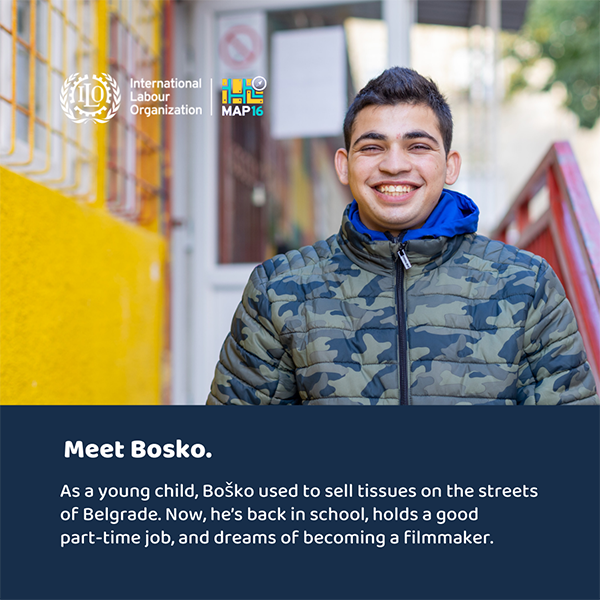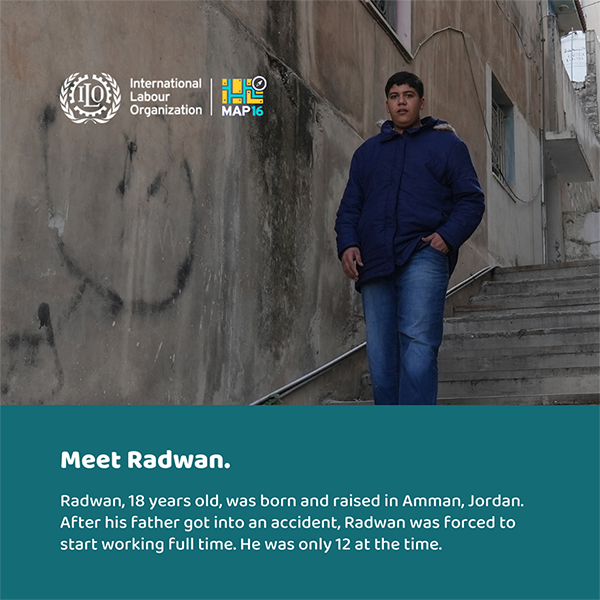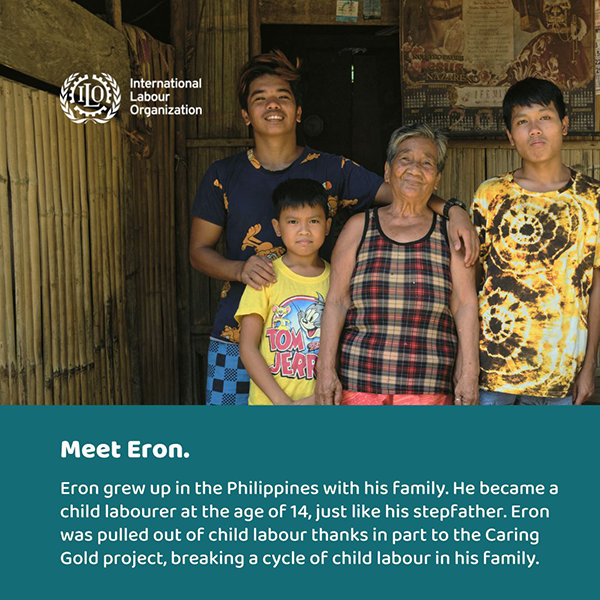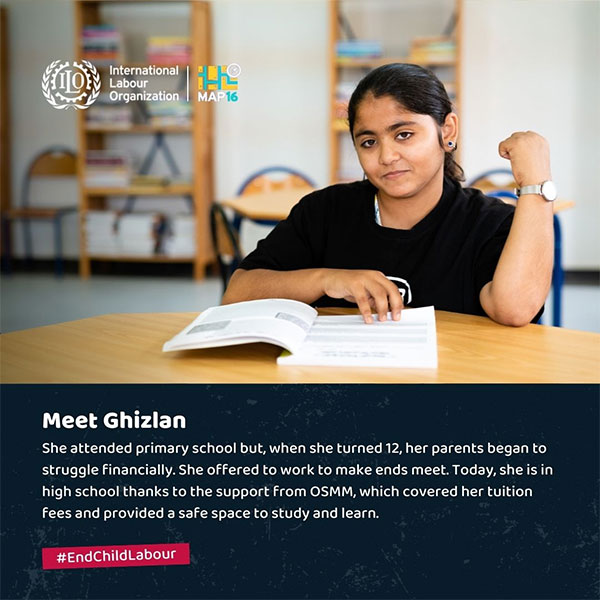Measurement, Awareness-Raising, and Policy Engagement (MAP 16) Project on Child Labor and Forced Labor
Print
The United States supports the goal of bringing meaningful change to the lives of the 152 million child laborers and the 25 million adults and children in forced labor around the world by eradicating child labor, forced labor and human trafficking. USDOL’s MAP 16 project supports this goal through efforts to (1) improve the knowledge base on child labor, forced labor and human trafficking; (2) improve awareness of these issues through the use of data-driven techniques; (3) strengthen policies and improve the capacity of governments and other stakeholders to combat child labor, forced labor, and human trafficking through national, regional, and global initiatives; and (4) strengthen partnerships to accelerate progress in combatting child labor, forced labor, and human trafficking.
The Problem
An estimated 152 million children work in child labor around the world, and an estimated 25 million children and adults suffer under forced labor conditions. Despite the progress that has been made globally in addressing child labor, forced labor, and human trafficking, ending these abusive practices will require an acceleration of efforts and greater concerted global action.
Our Strategy
The MAP 16 project is addressing knowledge gaps on child labor, forced labor and human trafficking through research and the development of new survey methodologies; improving awareness of these issues through the use of data-driven techniques; strengthenng policies and the capacity of governments and other stakeholders to combat child labor, forced labor, and human trafficking; and supporting partnerships to accelerate progress in combatting child labor, forced labor, and human trafficking.
Specific activities include data collection about child labor, forced labor, and human trafficking at the national, regional, and sectoral levels, including in Panama and Brazil; development of methods to measure child labor and forced labor in supply chains such as sugarcane and fishing; and the development of new guidelines on forced labor measurement. MAP 16 is also promoting innovative communications tools using child labor and forced labor data and supporting an awareness-raising campaign on child labor. The project is likewise supporting regional and sub-regional initiatives to eradicate child labor and forced labor in Africa and Latin America; engaging with governments, businesses, and other stakeholders to address child labor and forced labor in supply chains in sugarcane and fishing; and building the capacity of 14 governments to address child labor. Finally, the project supports business networks and other stakeholders to work together to develop policies to combat child labor, forced labor and human trafficking.
Results
- The MAP16 project provided support for training more than 25 National Statistical Offices on child labor data collection and analysis, and has published six reports on child labor and forced labor, including in supply chains. Some of these surveys are being used by the ILO to develop the global estimates of child labor and forced labor.
- With project support, six governments have adopted new legislation, policies, and protocols to address child labor. These include protocols for social service agencies in Serbia to improve how they handle cases of child labor among vulnerable minority populations.
- The project stood up a Global Business Network on Forced Labor in collaboration with the USDOL-funded Bridge project. Three business associations made commitments to address child labor due to advocacy and support from MAP16.
Related Learnings
Learn About Our Success
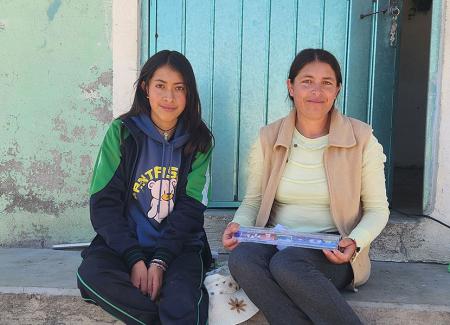
At just age 15, Isabel knows what it is like to worry about money. Two years ago, her father got sick, lost his job, and had to find part-time construction work in another city. The family’s income was tight, putting Isabel and her siblings at a high risk of engaging in child labor.
- Grantee:
- International Labor Organization (ILO)
- Contact Information:
- (202) 693-4843 / Office of Child Labor, Forced Labor, and Human Trafficking (OCFT)
- Tags:
- Child Labor
- Awareness
- Capacity Building
- Forced Labor
- Human Trafficking
- Measurement
- Policy
Related Project Resources
- Infancias en juego: dinámicas familiares y trabajo infantil
- Child Labour in Africa
- Projet MAP’16 Maroc - Renforcement des capacités des associations locales - Livrable 4: Rapport des 3 ateliers de formation (12 sessions de formation à distance) au niveau des trois zones d’intervention
- Standard operating procedures for children in hazardous child labour
- Estudio de métodos mixtos sobre el trabajo infantil en la caña de azúcar en Panamá
- Guidelines concerning the measurement of forced labour
- Guia: Diseñar e implementar encuestas locales para identificar niños, niñas y adolescentes en riesgo o en trabajo infantil en los territorios señalados por el Modelo de Identificación del Riesgo de Trabajo Infantil (MIRTI)
- Model de Identificacion del Riesgo de Trabajo Infantil: Chimaltenango, Guatemala
- Ending child labour, forced labour and human trafficking in global supply chains
- Encuesta de Percepción y Actitudes de la Población. Impacto de la pandemia COVID-19 y las medidas adoptadas por el gobierno sobre la vida cotidiana.
- Caracterización de trabajo infantil: San Pedro Sacatepéquez, San Marcos, Guatemala
- Caracterización de trabajo infantil: Estado de México, municipio de Villa Victoria
- Caracterización de trabajo infantil: Municipio de Tapachula, Chiapas, México
- Caracterización de trabajo infantil: Provincia de Limón, Cantón de Limón, Costa Rica
- Trabajo infantil y protección social en la niñez en Argentina
- Emerging Good Practices in the Elimination of Child Labour in the Middle East and North Africa
- MAP'16/Film documentaire
- Encuesta Nacional de Trabajo Infantil 2019 - Informe de Resultados
- Executive summary: child labour and family dynamics
- Resumen ejecutivo: trabajo infantil y dinámicas familiares
- Trabajo infantil y dinámicas familiares
- Executive summary: gender perspective in child labour
- Resumen ejecutivo: perspectiva de género en el trabajo infantil
- Perspectiva de género en el trabajo infantil
- Executive summary: child labour and social protection in childhood in Argentina
- Resumen ejecutivo: trabajo infantil y protección social in la niñez en Argentina
- Trabajo infantil y protección social en la niñez en Argentina
- Resumen ejecutivo: estudio regional del trabajo infantil y la protección social en la niñez en Argentina
- Estudio regional del trabajo infantil y la protección social en la niñez en Argentina
- Resumen ejecutivo: la política del Ingreso Familiar de Emergencia (IFE). Su potencial impacto en la participación de los y las adolescentes en el mercado de trabajo
- La política del Ingreso Familiar de Emergencia (IFE): Su potencial impacto en la participación de los y las adolescentes en el mercado de trabajo
- Executive summary: regional study of child labour and social protection in childhood in Argentina
- Executive summary: the Emergency Family Income (IFE) policy. Its impact on adolescent participation in the labour market
- Child labour and social protection targeted at children, adolescents and their households in Argentina: contributions to the debate on income protection policies related to child labour
- Trabajo infantil y protección social dirigida a la niñez, adolescencia y sus hogares en la Argentina: aportes para el diseño de políticas de protección de ingresos y su rol en la reducción y erradicación del trabajo infantil
- Contributions to the debate on gender perspective in child labour
- Trabajo infantil y perspectiva de género: aportes para el diseño de políticas públicas en el contexto de la crisis de la COVID-19
- Año Internacional para la Eliminación del Trabajo Infantil communication pieces
- El impacto de las políticas de protección social en el trabajo infantil
- Desafíos de la protección social para prevenir el trabajo infantil en Argentina
- Políticas de transferencia monetaria y trabajo adolescente
- Trabajo infantil y perspectiva de género
- Acciones integrales para reducir el trabajo infantil
- Trabajo infantil y políticas de protección social
- Dinámicas familiares, perspectiva de géneroy trabajo infantil
- Políticas y acciones para la protección de trayectorias escolares y la prevención del trabajo infantil en tiempos de pandemia
- Adolescentes: el acceso al trabajo decente y el desafío de la protección
- Determinantes del trabajo infantil y políticas públicas en Argentina
- La tolerancia social del trabajo infantil: un desafío para las políticas públicas de prevención y erradicación
- La educación frente al trabajo infantil y adolescente en Argentina
- Trabajo adolescente en Argentina: determinantes y políticas públicas
- ¿Por qué se naturaliza el trabajo infantil? Desafíos de las políticas públicas frente a la tolerancia social
- Desafíos de la protección social para prevenir el trabajo infantil
- Diferentes modalidades: prácticas educativo-laborales
- ¿Qué hacer si mi empresa quiere realizar prácticas educativo-laborales?
- Orientaciones para una conducta empresarial responsable
- Las prácticas educativo-laborales: aportes y recomendaciones para garantizar entornos de aprendizaje y experiencia laboral para jóvenes y adolescentes report
- Red de organismos de fiscalización del trabajo: desafíos y propuestas
- Red de organismos de fiscalización del trabajo: consensos, criterios y desafíos
- 1 Procedimiento de constatación de indicios de explotación laboral (IEL)
- 2 Denunciar la constatación de IEL
- 3 Contenidos básicos de un informe de inspección
- 4 Protección de niños, niñas y adolescentes frente a la trata y explotación laboral
- 5 La trata de personas con fines de explotación laboral
- Aportes sindicales para la prevención y erradicación del trabajo Infantil y la protección del trabajo adolescente
- Aportes sindicales para la prevención y erradicación del trabajo Infantil y la protección del trabajo adolescente: porcentajes y características del trabajo infantil en la Argentina
- Aportes sindicales para la prevención y erradicación del trabajo Infantil y la protección del trabajo adolescente: protagonismo del sector sindical en la prevención y erradicación del trabajo infantil
- Aportes sindicales para la prevención y erradicación del trabajo Infantil y la protección del trabajo adolescente: el trabajo infantil en la historia
- Aportes sindicales para la prevención y erradicación del trabajo Infantil y la protección del trabajo adolescente: pre-supuestos erróneos con relación al trabajo infantil
- Issue paper on child labour and education exclusion among indigenous children
- Issue paper on child labour and climate change
- Towards freedom at sea: handbook for the detection of forced labour in commercial fishing
- Dečji rad - prevencija, prepoznavanje i intervencija
- Exercise 2. recognition of child labor
- Vežba 2 prepoznavanje zloupotrebe dečjeg rada
- Exercise 3. work on reports of abuse of child labor
- Vežba 3 rad po prijavama o zloupotrebi dečijeg rada
- Exercise 4. indicators of child labor
- Vežba 4. indikatori zloupotrebe dečijeg rada
- Exercise 8. needs assessment child labor
- Vežba 8. procena potreba deteta žrtve zloupotrebe dečijeg rada
- Child labor: prevention, recognition and intervention: training for experts in social protection
- Dečiji rad: prevencija, prepoznavanje i intervencija: obuka za supervizore i druge stručnjake u socijalnoj zaštiti
- Manual for labour inspectors: preventing and comabating child labour in Timor-Leste
- National child labour survey 2016: analytical report Timor-Leste
- Drivers of Child Labour in Timor-Leste
- Rezumu: Timor-Leste levantamentu forsa traballu 2010-2013-2016 tendénsia prinsipál sira bazeia ba dadus armonizadu
- Summary: Timor-Leste labour force surveys 2010-2013-2016 main trends based on harmonized data
- Child labour: global estimates 2020, trends and the road forward
- Brief report: designing a comprehensive benefit package bundling all government schemes relevant for child labour families – MAP’16 India project
- Hard to see, harder to count: survey guidelines to estimate forced labour of adults and children (3rd edition)
- Understanding informality and child labour in sub-Saharan Africa
- Ethical guidelines for research on forced labour
- Ethical guidelines for research on child labour

